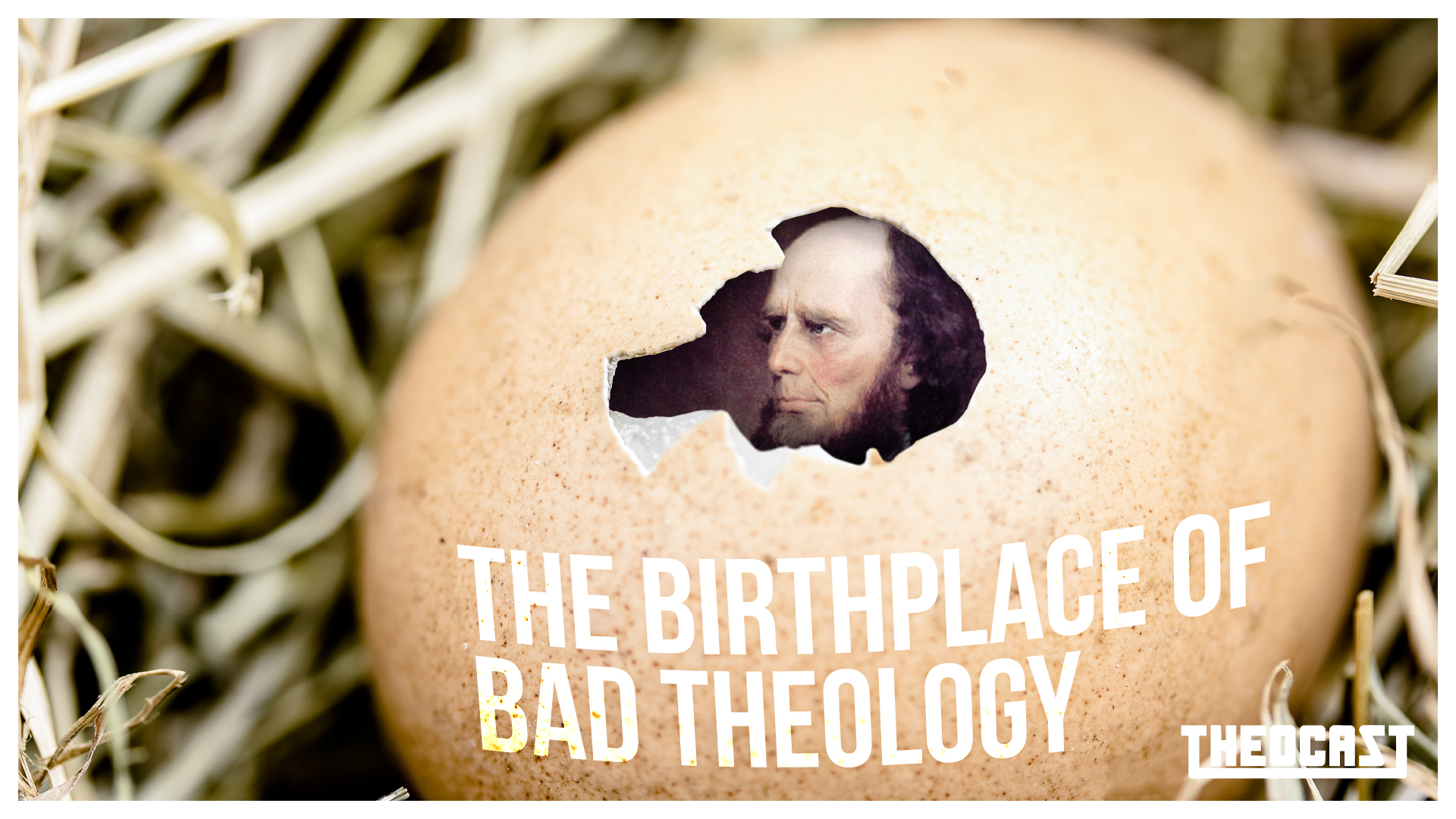
Your Sanctification Is Not for You
What is the purpose of your sanctification? Who is it for? (Hint: It’s not for you.) We survey a number of passages from the New Testament to demonstrate the point of our growth in Christ.

Jon and Justin follow up on the conversation last week about smuggling works into faith. Today’s episode is a little different than the norm. The guys critique teaching from John Piper, John MacArthur, and Doug Wilson on the relationship between faith and works. Multiple excerpts and quotes are cited, all of which are available in the show notes. The reason for this episode is to defend the clarity of the gospel–that we are saved by Christ alone and receive his merits by faith alone, apart from any works we could ever do.
Semper Reformanda: Jon and Justin talk about the legitimacy of critiquing doctrine that has been publicly taught and distributed. And then, the guys make a number of observations about the ways social and political concerns seem to be the tie that binds in many conservative Christian streams.
Resources:
Is DOUG WILSON a FALSE TEACHER?
Our episodes on the Law/Gospel Distinction
Our episode on “Smuggling Works into Faith”
Show notes with Quotes:
1689 LBCF Chapter 14 – Saving Faith
1689 LBCF Chapter 11- Justification
These works of faith, and this obedience of faith, these fruits of the Spirit that come by faith, are necessary for our final salvation. No holiness, no heaven (Hebrews 12:14). So, we should not speak of getting to heaven by faith alone in the same way we are justified by faith alone. Essential to the Christian life and necessary for final salvation is the killing of sin(Romans 8:13) and the pursuit of holiness(Hebrews 12:14).
//www.desiringgod.org/articles/does-god-really-save-us-by-faith-alone
Final salvation from future judgment is conditional. It will not happen apart from our persevering faith. … “salvation” refers to our future deliverance from the wrath of God at the judgment and entrance into eternal life.
John Piper, Desiring God: Meditations of a Christian Hedonist. Multnomah Books, 1996, 42.
[Jesus] says that on the day of judgment…people will “go away into eternal punishment” because they really failed to love their fellow believers: “As you did not do it to one of the least of these, you did not do it to me” (Matt. 25:45-46). There is no doubt that Jesus saw some measure of real, lived-out obedience to the will of God as necessary for final salvation.
John Piper, What Jesus Demands from the World. Lifeway Press, 2015, 160.
Though it may cause confusion, it is possible to use the word “justify” to describe how the fruit of good behavior works in the day of judgment. The fruits can “justify” us in the sense of proving that we are believers and belong to Jesus and have a right standing with God in him. That is how I understand Matthew 12:37, “By your words you will be justified, and by your words you will be condemned.”
What Jesus Demands from the World, 161n.
It is not accidental that the title of this book has a double meaning. The Future of Justification draws attention not only to where the doctrine itself may be going, but also to the critical importance of God’s future act of judgment when our justification will be confirmed. How will our obedience function in that Day?
John Piper, The Future of Justification: A Response to N. T. Wright. Crossway Books, 2008, 183-184.
Present justification is based on the substitutionary work of Christ alone, enjoyed in union with him through faith alone. Future justification is the open confirmation and declaration that in Christ Jesus we are perfectly blameless before God. This final judgment accords with our works. That is, the fruit of the Holy Spirit in our lives will be brought forward as the evidence and confirmation of true faith and union with Christ. Without that validating transformation, there will be no future salvation.
John Piper and N.T. Wright, compiled by Trevin Wax. “The Justification Debate: A Primer.” Christianity Today, June 29, 2009, accessed October 31, 2017,
In final salvation at the last judgment, faith is confirmed by the sanctifying fruit it has borne, and we are saved through that fruit and that faith.
“Does God Really Save Us by Faith Alone?” //www.desiringgod.org/articles/does-god-really-save-us-by-faith-alone
As Tom Schreiner says, the book “tackles one of the fundamental questions of our human condition: how can a person be right with God?”
The stunning Christian answer is: sola fide—faith alone. But be sure you hear this carefully and precisely: He says right with God by faith alone, not attain heaven by faith alone. There are other conditions for attaining heaven, but no others for entering a right relationship to God…
Such faith always “works by love” and produces the “obedience of faith.” And that obedience— imperfect as it is till the day we die—is not the “basis of justification, but . . . a necessary evidence and fruit of justification.” In this sense, love and obedience—inherent righteousness—is “required of believers, but not for justification”—that is, required for heaven, not for entering a right-standing with God…
Thus Schreiner closes his book with a joyful testimony—and I rejoice to join him in it: ”My confidence on the last day . . . will not rest on my transformation. I have too far to go to put any confidence in what I have accomplished. Instead, I rest on Jesus Christ. He is my righteousness. He is the guarantor of my salvation. I am justified by faith alone, in Christ alone, to the glory of God alone.”
Faith Alone: The Doctrine of Justification, by Thomas Schreiner (September, 2015)
MacArthur says of the rich young ruler: “No matter what he believed, since he was unwilling to forsake all, he could not be a disciple of Christ”
The Gospel according to Jesus (78)
Judas, MacArthur says, “had responded positively to Christ, but never with all his heart.”
The Gospel according to Jesus (103)
“Salvation isn’t the result of an intellectual exercise. It comes from a life lived in obedience and service to Christ as revealed in the Scripture; it’s the fruit of actions, not intentions. There’s no room for passive spectators: words without actions are empty and futile… The life we live, not the words we speak, determines our eternal destiny.”
Hard to Believe, page 93
“Many people believe justified means “just-as-if-I’d-never-sinned.” In other words, God says, “I count you righteous even though you’re really not.” It is true that God makes that declaration, but there is also a reality of righteousness. We are not only declared righteous; we are made righteous (Justification by Faith, 1988, 98).
This making righteous is accomplished by infusing Christ’s righteousness into Christians: “God actually credits righteousness to our account. He imputes righteousness to us; he infuses divine life into us. He regenerates and sanctifies us. He makes the unholy holy, and therefore declares that we are righteous…. There is a reality–God gives us righteousness, and thus he can declare that we are righteous” (Justification, 121).
MacArthur writes: “The believing sinner is justified by righteousness infused into him” (Justification, 122).
“The word justification is a technical term that refers to our legal standing before God: We have been declared to be just because of our faith. [This is not the Biblical or Protestant view.] But the word [justification] also embraces a radical and real transformation. Our moral character has been altered eternally through regeneration. Justification by faith means that God has both declared us righteous and made us righteous. We have been regenerated – made new by faith…. Justification is not only a state of being righteous; it is actual regeneration. We are made righteous by faith” (Justification, 132).
This, of course, is the official teaching of the Roman Church. Canon XI of the Council of Trent states:
“If any one saith, that men are justified, either by the sole imputation of the justice of Christ, or by the sole remission of sins, to the exclusion of the grace and the charity which is poured forth in their hearts by the Holy Ghost, and is inherent in them; or even that the grace whereby we are justified is only the favor of God: let him be anathema.” Canon XII states: “If any one saith, that justifying faith is nothing else but confidence in the divine mercy which remits sins for Christ’s sake; or, that this confidence alone is that whereby we are justified: Let him be anathema.”
Denies the covenant of works:
I believe the covenant of works mentioned in Chapter VII is badly named. I would prefer something like the covenant of life (WLC 20), or the covenant of creation. I believe that this covenant obligated Adam to whole-hearted obedience to the requirement of God. The one stipulation I would add is that, had Adam stood, he would have been required to thank God for His gracious protection and provision. And had Adam stood, he would have done so by believing the Word of God. In other words, it would all have been by grace through faith… [T]he “covenant of works” was not meritorious and we deny that any covenant can be kept without faith.
CREC EXAMINATION, PAGES 1-2, 4
We deny that law and gospel should be considered as hermeneutics, or treated as such. We believe that any passage, whether indicative or imperative, can be heard by the faithful as good news, and that any passage, whether containing gospel promises or not, will be heard by the rebellious as intolerable demand. The fundamental division is not in the text, but rather in the human heart.
JOINT FEDERAL VISION STATEMENT
Changing the definition of faith
In the New Testament, obedience is a good word. Also in the New Testament, works is not, unless it is modified with a word like good. We are called to good works (Titus 2:7 ), but we are not saved by works (Eph. 2:8-9).
By way of contrast, sinners do not obey the truth (Rom. 2:8). The Lord is the author of eternal salvation for all who obey Him (Heb. 5:9). All nations are summoned to the obedience of faith (Rom. 1:5). Obedience is unto righteousness (Rom. 6:16). Every thought is to be brought to the obedience of Christ (2 Cor. 10:5). God gives the Holy Spirit to those who obey Him (Acts 5:32). And of course, obedience is an evil thing when it is rendered to the wrong master (Rom. 6:12), which should be obvious enough. But the bottom line is that simple words obey and obedience should not set off alarm bells for people who read their Bibles.
//dougwils.com/books-and-culture/s7-engaging-the-culture/like-a-gelatinous-pudding.html
Faith is the only instrument God uses in our justification. But when God has done this wonderful work, the faithful instrument does not shrivel up and die. It continues to love God and obey Him. If it does not, but just lies there like a corpse, then we have good reason to believe that it was lying there like a corpse some days before—not being therefore an instrument of justification. Faith without works is a dead faith, and a dead faith never justified anybody.
Reformed is not enough (p. 48).
The means by which men persevere in the covenant is faithfulness. In other words, to assert that men fall away because their salvation was contingent upon continued faithfulness in the gospel is not to deny the sovereignty of God at all.
Wilson, Douglas . Reformed Is Not Enough: Recovering the Objectivity of the Covenant . Canon Press.
Because this is the case, James can speak of justification by works. He is not speaking of rabbinical works-righteousness or Pelagian self-salvation or medieval merit theology. Rather, he compares it to the relationship of body and spirit—a living, organic entity.
Wilson, Douglas . Reformed Is Not Enough: Recovering the Objectivity of the Covenant . Canon Press.
Not bare bones faith. Not assent. Devils have that. True faith is more than assent. We are being accused of denying sola fide because we deny solus assensus. This is the rub, since we’re all affirming this. Why are we heretics because we say faith cannot be separated from trust and obedience, and because we say saving faith cannot be separated from a life of obedience and trust?
Douglas Wilson, The Monroe Four Speak Out, 5, 6
When asked in the interview, “Doug, when you cite ‘continuing in goodness’ in Rom. 11 in your 2002 lecture, is that the cause of our salvation or the fruit of it?”, Wilson replied:
Yes (laughter all around).
Look, in Colossians Paul says as you received Christ so walk in him. So the way we become Christians is the way we stay Christians is the way we finish as Christians—by faith from first to last.
So we continue in God’s goodness by trust. We stand by faith—they fell, but you stand—doing that to the end is how you come to your salvation. It’s the gift of God lest anyone boast. I believe we are saved by faith from first to last, which is why I have been accused of denying sola fide. Wisdom is vindicated by her children.
Christian Renewal,
The Monroe Four Speak Out, cited in The Counsel of Chalcedon, Volume 1, May 2004, 38.
True faith and works of obedience are never in opposition
TESTIMONY ON THE MARS TESTIMONY – Blog article
[L]ife and obedience are essential characteristics of the instrumentality of faith
OBEDIENCE UNTO JUSTIFICATION – Blog article
[I]t is indisputable that works is the animating principle of faith.
FAITH, DEAD OR ALIVE? – Blog article
I am treating obedient faith and living faith as synonymous… it is obedient in its life, and in that living condition it is the instrument of our justification.
LIVING FAITH – Blog article
[OPC Report on Justification:] “14. Including works (by use of ‘faithfulness,’ ‘obedience,’ etc.) in the very definition of faith [is out of accord with Scripture].”
No. To include faithfulness in the very nature of living faith is not to intrude works. Faithful faith justifies. Faithless faith does not.
THE OPC REPORT ON THE FEDERAL VISION
Does obedience (in the context of justifying faith) mean works, or does it mean life? If the former, then mixing it into justifying faith is death warmed over. If the latter, then leaving it out is death stone cold.
RECAPITULATION DRIVES OUT GRACE – Blog article
Though not ordinarily challenging the terminology of “justification by faith alone,” they have changed the definition of faith and have therefore changed the meaning of “faith alone.”

What is the purpose of your sanctification? Who is it for? (Hint: It’s not for you.) We survey a number of passages from the New Testament to demonstrate the point of our growth in Christ.

Where does all bad theology come from? From our perspective, it comes from a loss of the church’s one foundation–that is, Jesus Christ and his work counted to us by faith alone.

Should you regularly be questioning your salvation? What about self-examination? When and how should you do that? The guys answer these questions and consider several passages of Scripture that speak to these issues.
Deepen your understanding of Reformed theology and strengthen your faith with our weekly book recommendations.